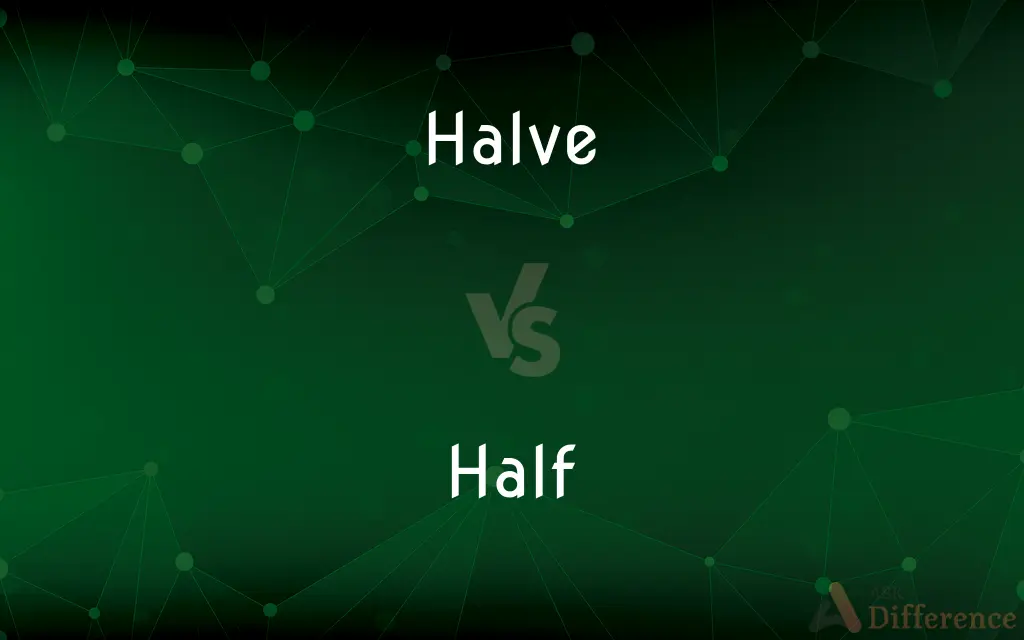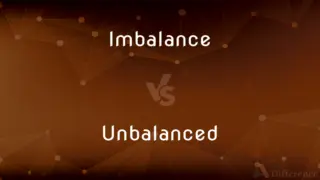Halve vs. Half — What's the Difference?
By Tayyaba Rehman & Maham Liaqat — Updated on April 24, 2024
"Halve" is a verb meaning to divide something into two equal parts, while "half" is a noun or adjective referring to one of two equal parts of a whole.

Difference Between Halve and Half
Table of Contents
ADVERTISEMENT
Key Differences
Halve is used as a verb indicating the action of splitting something into two equal portions. On the other hand, half serves as a noun or adjective, describing one of the portions resulting from such a division.
When you halve a quantity or object, you are performing an action. Whereas, half describes the result of this action, referring to either of the two equal segments.
In recipes or instructions, one might read "halve the ingredients" to adjust the size of the dish being prepared. In contrast, half might be used to specify the quantity of an ingredient, such as "use half a cup of sugar."
The usage of halve is more dynamic, relating to the process of division. In comparison, half is static, denoting a state or condition of being divided.
Knowing when to use halve versus half is crucial for clear communication, especially in contexts involving measurements or proportions.
ADVERTISEMENT
Comparison Chart
Part of Speech
Verb
Noun/Adjective
Function
To divide into two equal parts
Describes one of the two parts or 50% of something
Usage in a Sentence
"Please halve the cake before serving."
"I'll take half of the cake, please."
Example in Numbers
"Halve 100 to get 50."
"Half of 100 is 50."
Common Contexts
Cooking, measurements, reductions
Quantities, descriptions, sharing
Compare with Definitions
Halve
To split something evenly into two portions.
Halve the dough, then shape each piece into a loaf.
Half
Constituting 50% of a total amount.
More than half of the area is covered by forest.
Halve
To divide something into two equal parts.
She decided to halve the recipe to serve fewer people.
Half
Used to describe something incomplete or partial.
He's half convinced that the idea will work.
Halve
To lessen or decrease by half.
The new technology helps halve the time needed to complete the task.
Half
One of two equal parts of a whole.
Half of the students voted for the trip.
Halve
To reduce something by 50%.
The company plans to halve its emissions over the next decade.
Half
A fraction, specifically 1/2 of anything.
She drank half her coffee before leaving.
Halve
To share something equally between two parties.
The agreement was to halve the profits.
Half
Referring to one of two equal segments.
I spent the first half of the day cleaning.
Halve
To divide (something) into two equal portions or parts.
Half
One of two equal parts that together constitute a whole.
Halve
To lessen or reduce by half
Halved the recipe to serve two.
Half
One part approximately equal to the remaining part.
Halve
(Informal) To share (something) equally
The twins halve everything.
Half
(Informal) A 50-cent piece.
Halve
(Sports) To play (a golf game or hole) using the same number of strokes as one's opponent.
Half
One of the two playing periods into which certain games are divided.
Halve
(transitive) To reduce to half the original amount.
Half
A halfback.
Halve
(transitive) To divide into two halves.
Half
Chiefly British A school term; a semester.
Halve
(transitive) To make up half of.
Half
Half an hour
A half past one.
Halve
To join two pieces of timber etc. by cutting away each for half its thickness at the joining place, and fitting together.
Half
Being one of two equal parts.
Halve
In match play, to achieve a tie or draw on.
Half
Being approximately a half.
Halve
A half.
Half
Partial or incomplete
Gave me a half smile.
Halve
To divide into two equal parts; as, to halve an apple; to be or form half of.
So far apart their lives are thrownFrom the twin soul that halves their own.
Half
To the extent of exactly or nearly 50 percent
The tank is half empty.
Halve
To join, as two pieces of timber, by cutting away each for half its thickness at the joining place, and fitting together.
Half
Not completely or sufficiently; partly
Only half right.
Halve
Of a hole, match, etc., to reach or play in the same number of strokes as an opponent.
Half
One of two usually roughly equal parts into which anything may be divided, or considered as divided.
I ate the slightly smaller half of the apple.
You don’t know the half of it.
Of the passengers on the plane, half were English.
The cake was delicious: half was vanilla and half was chocolate.
Halve
Divide by two; divide into halves;
Halve the cake
Half
(sports) One of the two opposite parts of the playing field of various sports, in which each starts the game.
Half
Half of a standard measure, chiefly: (British) half a pint of beer or cider.
Half
(preceded by “a” or a number) The fraction obtained by dividing 1 by 2.
Three-quarters minus a quarter is a half.
Half
Any of the three terms at Eton College, for Michaelmas, Lent, and summer.
Half
(slang) A half sibling.
Half
A child ticket.
Half
(sports) abbreviated form for half marathon.
Half
(numismatic slang) half-dollar
Half
Consisting of a half (½, 50%).
A half kilo
A half hour
A half dollar
Half
Consisting of some indefinite portion resembling a half; approximately a half, whether more or less; partial; imperfect.
A half truth
Half
(of a sibling) Having one parent (rather than two) in common.
Half
(of a relative other than a sibling) Related through one common grandparent or ancestor rather than two.
Half
In two equal parts or to an equal degree.
Half
In some part approximating a half.
Half
Partially; imperfectly.
Half done
Half persuaded
Half conscious
He does sometimes half wish to change his life, but it is too difficult.
Half
Practically, nearly.
Half
To halve.
Half
Half past; a half-hour (30 minutes) after the last hour.
The time is 9:30; it is half nine.
Half
A half-hour to (preceding) the next hour.
In some countries, "half seven" means 6:30.
Half
(theatre) A call reminding performers that the performance will begin in thirty minutes.
Half
Consisting of a moiety, or half; as, a half bushel; a half hour; a half dollar; a half view.
Half
Consisting of some indefinite portion resembling a half; approximately a half, whether more or less; partial; imperfect; as, a half dream; half knowledge.
Assumed from thence a half consent.
Half
In an equal part or degree; in some part approximating a half; partially; imperfectly; as, half-colored, half done, half-hearted, half persuaded, half conscious.
Their children spoke halfin the speech of Ashdod.
Half
Part; side; behalf.
The four halves of the house.
Half
One of two equal parts into which anything may be divided, or considered as divided; - sometimes followed by of; as, a half of an apple.
Not half his riches known, and yet despised.
A friendship so completePortioned in halves between us.
Half
To halve. [Obs.] See Halve.
Half
One of two equal parts of a divisible whole;
Half a loaf
Half an hour
A century and one half
Half
In various games or performances: either of two periods of play separated by an interval
Half
Consisting of one of two equivalent parts in value or quantity;
A half chicken
Lasted a half hour
Half
Partial;
Gave me a half smile
He did only a half job
Half
(of siblings) related through one parent only;
A half brother
Half sister
Half
Partially or to the extent of a half;
He was half hidden by the bushes
Common Curiosities
What is the difference between halve and half?
Halve is a verb that means to divide into two equal parts, while half is a noun or adjective referring to one of those parts.
How do you halve an odd number?
Halving an odd number results in a fractional half, such as halving 3 gives 1.5.
Is "half" always related to the number 50%?
Yes, half generally refers to 50% of a whole, whether it's a quantity, amount, or time period.
Can I use "half" as a verb?
No, "half" is not typically used as a verb; "halve" is the correct verb for dividing something into two equal parts.
How do I know when to use "halve" or "half"?
Use "halve" when you are performing the action of dividing, and "half" when referring to the portion resulting from the division.
Can "half" be used in formal writing?
Yes, "half" is perfectly acceptable in both formal and informal contexts.
What is the plural form of "half"?
The plural form of "half" is "halves."
What does it mean to halve your effort?
To halve your effort means to reduce the amount of energy or work you put into an activity by 50%.
Are there any expressions using "half"?
Common expressions include "half-hearted," "half-baked idea," and "better half."
What is a typical context for using "halve"?
A typical context for using "halve" is in cooking, such as halving ingredients to adjust a recipe.
Why is it important to distinguish between "halve" and "half"?
It's important for accuracy in communication, especially in contexts where precise measurements or proportions are critical.
How does one visually represent "half"?
Visually, "half" can be represented by dividing a shape or object into two symmetrical parts.
Can I say "halves" when referring to two people sharing something?
Yes, it is correct to say that two people "halves" something when they share it equally.
Can the term "half" be used mathematically?
Yes, "half" is often used in mathematics to express one of two equal parts of a number.
What are some mistakes people make with "halve" and "half"?
A common mistake is using "half" as a verb, which is grammatically incorrect; the correct verb is "halve".
Share Your Discovery

Previous Comparison
Imbalance vs. Unbalanced
Next Comparison
Monophyletic vs. ParaphyleticAuthor Spotlight
Written by
Tayyaba RehmanTayyaba Rehman is a distinguished writer, currently serving as a primary contributor to askdifference.com. As a researcher in semantics and etymology, Tayyaba's passion for the complexity of languages and their distinctions has found a perfect home on the platform. Tayyaba delves into the intricacies of language, distinguishing between commonly confused words and phrases, thereby providing clarity for readers worldwide.
Co-written by
Maham Liaqat















































